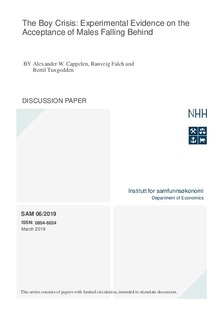| dc.contributor.author | Cappelen, Alexander W. | |
| dc.contributor.author | Falch, Ranveig | |
| dc.contributor.author | Tungodden, Bertil | |
| dc.date.accessioned | 2019-03-08T07:41:15Z | |
| dc.date.available | 2019-03-08T07:41:15Z | |
| dc.date.issued | 2019-03-01 | |
| dc.identifier.issn | 0804-6824 | |
| dc.identifier.uri | http://hdl.handle.net/11250/2589254 | |
| dc.description.abstract | The ‘boy crisis’ prompts the question of whether people interpret inequalities differently depending on whether males or females are lagging behind. We study this question in a novel large-scale distributive experiment involving more than 5,000 Americans. Our data provide strong evidence of a gender bias against low-performing males, particularly among female participants. A large set of additional treatments establishes that the gender bias reflects statistical fairness discrimination. The study provides novel evidence on the nature of discrimination and on how males falling behind are perceived by society. | nb_NO |
| dc.language.iso | eng | nb_NO |
| dc.publisher | Institutt for samfunnsøkonomi | nb_NO |
| dc.relation.ispartofseries | DP SAM;06/2019 | |
| dc.subject | Gender bias, boy crisis, statistical fairness discrimination, large-scale experiment | nb_NO |
| dc.title | The Boy Crisis: Experimental Evidence on the Acceptance of Males Falling Behind | nb_NO |
| dc.type | Working paper | nb_NO |
| dc.subject.nsi | Samfunnsvitenskap | nb_NO |
| dc.source.pagenumber | 83 | nb_NO |
| dc.relation.project | 262675 | nb_NO |
